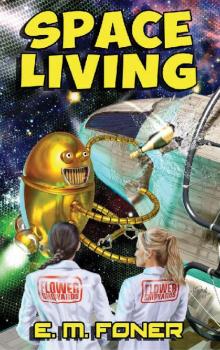- Home
- E. M. Foner
Freelance On The Galactic Tunnel Network
Freelance On The Galactic Tunnel Network Read online
Freelance
On The Galactic Tunnel Network
Copyright 2020 by E. M. Foner
One
“Let me make sure I have this straight,” Walter said to the young reporter. “You’re not willing to write about food anymore, but you’re not resigning from the paper.”
“Now you’ve got it,” Georgia said, beaming a smile at the managing editor of the Galactic Free Press. “So we’re all set?”
“Wait. Please, take a seat. I’m still a little lost here.”
“It’s simple. When I first came to work at the paper I was told that everybody has to pay their dues before they can choose their own assignments. Now I’ve paid my dues and I’m ready to become an investigative journalist.”
“I admire your enthusiasm, but we have a system in place,” Walter told her. “I know I say that my door is always open, but you’re supposed to start by bringing new story ideas to your section editor, and then the two of you would present together to the editorial board. We take investigative journalism very seriously.”
“That’s why I want to do it,” Georgia said, making it sound like the managing editor had just stated the most obvious fact in the world. “If there’s nothing else…”
“But you can’t just declare yourself an investigative journalist!”
“Why not? I have a four-year degree in journalism from the New University System on Earth.”
“And we agreed to overlook that particular shortcoming in your background when we gave you a job. Most of our employees get their start writing for student papers via their teacher bots or reporting on the Children’s News Network. In many cases, we’ve already picked up some of their stories through syndication before they even apply here. Our publisher prefers hands-on experience, but I have a soft spot for Earth degrees since I was educated there myself.”
“It’s not my fault I grew up without a teacher bot,” Georgia said. “My parents are anti-alien and they sent me to the commune school. I earned a full scholarship to the New University based on the competitive entrance exams.”
“Yes, and I’m sure that played into our decision to give you a chance, but all of this is beside the point. We try to give our staff the maximum flexibility in determining their work/life balance, but when it comes to reporting, I’m afraid that we’re sticklers for insisting our employees write the stories they’re assigned. The Galactic Free Press is like a giant puzzle,” Walter continued with one of his favorite analogies. “We have over a hundred section editors managing thousands of reporters to provide the information our readers have come to expect. You’re being paid to report on the local food scene, and if you want to run off and do something else, we’ll have to transfer your salary to whoever steps up and takes your place.”
“That makes perfect sense. After all, investigative journalism must pay better than food writing.”
Walter massaged his temples and fought against the urge to put his head down on his desk and simply wait for the young reporter to leave him in peace.
“We don’t have an open slot for an investigative journalist at the moment, but I’d be happy to add you to the list of candidates.”
“No, I want to start now,” Georgia insisted. “I left Earth three years ago and I haven’t been off Union Station since I got here. There are large human populations spread across hundreds of worlds and alien orbitals around the tunnel network, but the farthest I’ve ever traveled to report a story is the distance from the nearest lift tube to a restaurant. The most exciting assignment I’ve had since taking this job was sampling tribute recipes for the All Species Cookbook.”
“But you’re not quitting?”
“Of course not,” Georgia said, looking shocked at the idea. “I’ve worked hard to get where I am.”
“So you’ll talk this over with your section editor…”
“My editor told me to come and see you.”
“I understand,” Walter said, glancing towards the grandfather clock in the corner as if he hoped that time would run out and save him. “So you aren’t willing to do your job anymore, but you still want to work for us?”
“Right. I’m going to investigate financial fraud. Ever since I read that series of articles about the retired folks who got scammed on Flower, I’ve been spending all of my free time studying up on the history of financial crimes in a self-directed Open University extension course. Libby says that I’m ready.”
“The Stryx station librarian told you to change jobs?”
“Well, she might have said that I’m as ready as I’ll ever be, but it amounts to the same thing,” Georgia insisted. “I’m not leaving this office until you agree.”
“It just doesn’t work that way. What’s this big story you want to investigate?”
“Colony One. The whole thing is a scam. I can feel it in my bones.”
“I’m sorry, I’m not sure I heard you correctly,” Walter said. “You want to investigate Colony One?”
“Exactly. Humans have been going out on alien-owned colony ships as contract workers for decades, and with Flower, we have a Dollnick colony ship working for us, even if she just goes around in a great big circle visiting sovereign human communities. But purchasing a colony ship for ourselves would cost more than humanity is worth.”
“Their goal is to buy a scrapped ship and refurbish it in an alien shipyard. They have the backing of EarthCent, and coincidentally, Colony One advertises their meetings in our paper.”
“Are you saying I can’t move into investigative journalism because Colony One sponsors the free edition?”
“Now you’re conflating two different subjects,” Walter protested. “Let me make this as simple for you as possible. If you’re willing to report the stories your section editor assigns, then you’re welcome to continue working for us as a full-time employee. If you need to go off and do your own thing, I suggest you take a leave of absence, or change your status to freelance and—”
“How would that work?” Georgia interrupted.
“Well, since you’ve reached three years of employment with us, we would allow you to keep your press credentials, your translation implant, and your programmable cred. You would be assigned to the freelance desk, which would pay you for any stories they accept.”
“That’s what I want,” Georgia said, getting up again. “I’m available to start right away.”
“Freelancers are always available to start right away, it’s the nature of the business,” Walter told her. He rose as well and offered her a handshake. “I wish you the best, and I’ll be watching for your byline.”
“Thank you. Could I ask what it pays?”
“The freelance editors have leeway in determining compensation, but in recognition of the fact that you are paying your own expenses, the per-story rate is appreciably higher than what our full-time reporters earn on a prorated basis.”
“Can I get an advance?”
“I’m afraid that advances are only available to freelancers who establish a track record with the paper.”
“But I’ve been working for you three years,” she protested.
“A track record as a freelancer. If you intend to travel in pursuit of your story, the freelance desk may be willing to offer a partial subsidy if you’re willing to write about the local cuisine.”
Georgia left the managing editor’s office, and after consulting with the receptionist, made her way through the cubicle maze to a group of desks in the corner of the large space occupied by the Galactic Free Press. Something that looked like an old harpoon was suspended from the ceiling, and a sign hanging from the shaft read, “Freelance Desk.”
“Hello?” she called, loo
king around the area, which appeared to be empty. “Anybody here?”
“Right behind you,” a voice announced, and Georgia turned to see a silver-haired man with a mug of coffee in one hand and a sticky bun in the other. “I’m Roland. How can I help you?”
“Georgia,” she said, offering a hand, and then realizing that he couldn’t reciprocate. “Sorry. I’m here about becoming a freelancer.”
Roland glanced at the Galactic Free Press ID hanging from a lanyard around her neck and snorted. “Another one, huh? What is it this time? War? Sports?”
“I don’t understand.”
The man set down his sticky bun, half-sat on the desktop next to it, and took a sip of his coffee before responding. “Have you been through the kidnap avoidance training course?”
“I graduated last year,” Georgia said. “I have a certificate somewhere if you need to see it.”
“And are you double-dipping from EarthCent Intelligence?” he asked suspiciously.
“No. I’ve been working as a food writer the last three years but I’m ready to become an investigative journalist. Walter said you might give me an advance if I commit to turning in food stories from the places I visit. Why did you think I worked for EarthCent Intelligence?”
“We get spies in here all the time hoping to use the paper as cover while collecting a salary from two employers,” Roland explained, then took another sip from his coffee. “I’ll have to talk with your section editor, but I suspect we can do something for you. Food articles always pull good read rates. What’s the big story you’re working on?”
“I’m going to investigate Colony One,” Georgia said proudly.
“Nothing there,” the freelance editor told her. “Still, if you’re planning on following them around to their local seminars, you’ll learn something about chasing down leads that may come in handy later.”
“Why is everybody so sure that it’s not a scam? They’re raising an enormous amount of money to buy and recondition a colony ship from one of the human-sized species.”
“But they’re only taking pledges,” Roland pointed out. “The first phase is to get enough funds committed for the aliens to take them seriously, and only then will they try to negotiate a price and a shipyard lease. Colony ships aren’t two-man traders, you know. Between technology transfer issues, resident artificial intelligence, and the fact that the tunnel network might go a thousand years at a stretch without seeing a colony ship retired, it doesn’t strike me as a promising field for scammers.”
“That’s what makes it perfect,” Georgia insisted. “Nobody expects anything to come of it anytime soon, but the promoters must be paying themselves salaries and travel expenses. The scam is that by keeping the focus on sums in the trillions, they can skim off millions and nobody will ever think twice about it.”
“Nobody but you. My gut tells me that you’re off base on this, but the whole point of going freelance is that you can do what you want with your time. When are you planning on leaving?”
“I have to arrange for transportation, and whatever advance you can pay me for food stories will play into my plans. I have three years of savings, but it hasn’t been cheap living here.”
“I admire the conviction of youth. You’re what? Twenty-five?”
“My birthday is today. Becoming an investigative journalist is my present to myself.”
“Check back in with me tomorrow and we’ll see what we can do about that advance, but don’t expect instant riches. The most we ever extend to employees who go freelance amounts to a cycle’s pay.”
“I’ll take what I can get. Thank you.”
Georgia practically skipped out of the main office, where she’d been sharing a cubicle with several other beat reporters ever since being assigned to food writing, and made a beeline for the nearest lift tube.
“Tunnel Trips spaceship rentals, the place that advertises in the paper,” she instructed the conveyance. A thought struck her as the capsule began to move. “Do you think I needed to make a reservation first, Libby?”
“Due to the relatively small size of the rental fleet, reserving in advance is the best way to assure availability for the dates you require,” the Stryx station librarian responded. “How long are you planning to be away?”
“I don’t know, as long as it takes, I guess. You’re the one who told me that if I want to chase all over the galaxy in pursuit of a story, I may as well get started.”
“If that’s what you heard. Will you be keeping your apartment?”
“Yes, of course. It’s the only home I have.”
“If you’re leaving for an extended period, you’ll be paying for a space you aren’t using, and I expect your finances will be tight.”
“Yes, but what else can I do?”
“We provide a storage service for long-term renters and you recently qualified. I can send bots to clean out your apartment and put everything in storage at a cost of ten percent of your current rent, plus a one-time fee of fifty creds for moving expenses. You can contact me from anywhere with a return date, and I’ll have your things installed in a new apartment before you arrive.”
“All of that for fifty creds plus ten percent of my regular rent?”
“Ten percent per cycle,” the station librarian explained. “The fee is ongoing, but I can have it taken out of your security deposit, though you’ll have to replenish the reserve when you return.”
“That would set me up for more than a year. I’ll do it,” Georgia said. The doors opened on a familiar corridor and she stepped out of the capsule. “Hey. This is where I took my kidnap avoidance training.”
“Mac’s Bones,” Libby continued the conversation over the reporter’s implant. “The leaseholder sublets space for training to EarthCent Intelligence, and he also has a small-ship campground, plus the new rental agency. The kiosk isn’t far from the entrance.”
A minute later, Georgia found herself standing at a small counter manned by a cheerful Horten girl whose mood was apparent from her brown skin.
“Welcome to Tunnel Trips. I’m Marilla and I’ll be your agent. Do you have a reservation, Miss?”
“Georgia Hunt. I don’t, actually. Are all of those ships taken?” she asked, gesturing in the direction of the parking area.
“The three ships with full advertising wraps are the only rentals, the rest are here for repairs or are taking advantage of the camping facility and chandlery.”
“But with three to choose from, my not having a reservation won’t be a problem.”
“We do book most of our rentals in advance so I’ll have to check the schedule,” Marilla said apologetically. “I know that two of the ships are already spoken for tomorrow, so unless you’re only going somewhere overnight…”
“I don’t know how long I’ll be gone. Months, I think.”
“Months?”
“Sorry, I meant a cycle or more.”
“I understand Humanese, it’s just that we’ve never done such a long-term rental before,” the Horten girl said. “We only started the business recently.”
“Will long-term be less expensive than renting by the day? I couldn’t afford the daily rate I’ve seen advertised.”
“Seventy-nine creds a day, not including optional Thark insurance, which is another ten creds a day. How much were you hoping to pay?”
“Are we bargaining now?”
“To be honest, we’ve never discussed the possibility of open-ended rentals. The ships are single-cabin craft, as you can see, without any cargo capacity. You can’t take them off the tunnel network, and they certainly aren’t capable of landing on a planet, so we mainly rent them to businessmen who are looking for an alternative to multi-stop trips on commercial liners.”
“I’ll be staying on the tunnel network, I think,” Georgia said. “But seventy-nine creds a day is more than I earn when I’m working full-time. I was hoping it would be closer to what I’m going to save on rent while I’m not here.”
“Do you have exp
erience living in Zero-G?”
“Just the time it took to get from the space elevator hub at Earth to the liner I took to come out here. I got pretty sick.”
“What is the purpose of your rental?”
“I’m a reporter for the Galactic Free Press. I’m investigating a story, but I’ll also be sending in regular pieces about local food culture.”
“Let me—Mr. McAllister?” Marilla called, waving to an older man in coveralls who was walking a dog the size of a small pony. “Could you come here a minute?”
“Isn’t that the ambassador’s husband?” Georgia asked in a hushed voice. “I don’t want to make trouble for anybody.”
“In addition to holding the lease on Mac’s Bones, he’s a part-owner in Tunnel Trips and has a lot of experience in space travel,” the Horten girl told Georgia. “Plus, he’s really friendly.”
“Joe McAllister,” the owner of Mac’s Bones introduced himself, offering Georgia a handshake. “Beowulf acts as if he knows you.”
“Georgia Hunt. I met Beowulf last year when I was taking the kidnap avoidance course for Galactic Free Press reporters. I used to share my lunch with him.”
“No surprise there. Did you have a question about one of the advanced courses? Thomas and Chance are at an intelligence conference, but I saw Judith around here earlier, and she could probably help,” Joe said, looking back in the direction of the training camp.
“Georgia is interested in a long-term rental, Mr. McAllister,” Marilla said. “Like, indefinite.”
“We don’t have a rule against it if there’s a ship available, but I can’t imagine it’s the best option. Where are you going?”
“That’s just it, I’m not sure yet,” Georgia replied. “I’m an investigative journalist, or I will be as soon as I leave Union Station, and I don’t know where the story will take me. I plan to catch up with the Colony One people and follow them for a while.”
“Doing that in a rental would get expensive in a hurry,” Joe said doubtfully. “I have a friend who keeps a two-man trader she’s not using in the Stryx stasis lot. Lynx is currently serving as the third officer on Flower, so she’d probably be willing to rent it to you as long as you could put down a security deposit and buy Thark insurance. How much piloting experience do you have?”

 Last Night on Union Station (EarthCent Ambassador Book 16)
Last Night on Union Station (EarthCent Ambassador Book 16) Empire Night on Union Station (EarthCent Ambassador Book 18)
Empire Night on Union Station (EarthCent Ambassador Book 18) Space Living (EarthCent Universe Book 4)
Space Living (EarthCent Universe Book 4) Review Night on Union Station (EarthCent Ambassador Book 11)
Review Night on Union Station (EarthCent Ambassador Book 11) Assisted Living
Assisted Living Con Living
Con Living Freelance On The Galactic Tunnel Network
Freelance On The Galactic Tunnel Network Career Night on Union Station
Career Night on Union Station Career Night on Union Station (EarthCent Ambassador Book 15)
Career Night on Union Station (EarthCent Ambassador Book 15) Word Night on Union Station (EarthCent Ambassador Book 9)
Word Night on Union Station (EarthCent Ambassador Book 9) Soup Night on Union Station
Soup Night on Union Station Human Test
Human Test Spy Night on Union Station (EarthCent Ambassador Book 4)
Spy Night on Union Station (EarthCent Ambassador Book 4) Family Night on Union Station (EarthCent Ambassador Book 12)
Family Night on Union Station (EarthCent Ambassador Book 12) Party Night on Union Station (EarthCent Ambassador Book 10)
Party Night on Union Station (EarthCent Ambassador Book 10) Turing Test
Turing Test Alien Night on Union Station (EarthCent Ambassador Book 2)
Alien Night on Union Station (EarthCent Ambassador Book 2) Wanderers On Union Station (EarthCent Ambassador Book 6)
Wanderers On Union Station (EarthCent Ambassador Book 6) Vacation on Union Station (EarthCent Ambassador Book 7)
Vacation on Union Station (EarthCent Ambassador Book 7) Book Night on Union Station (EarthCent Ambassasor 13)
Book Night on Union Station (EarthCent Ambassasor 13) LARP Night on Union Station
LARP Night on Union Station Carnival On Union Station (EarthCent Ambassador Book 5)
Carnival On Union Station (EarthCent Ambassador Book 5) LARP Night on Union Station (EarthCent Ambassador Book 14)
LARP Night on Union Station (EarthCent Ambassador Book 14) Book Night on Union Station
Book Night on Union Station High Priest on Union Station (EarthCent Ambassador Book 3)
High Priest on Union Station (EarthCent Ambassador Book 3) Meghan's Dragon
Meghan's Dragon Human Test (AI Diaries Book 2)
Human Test (AI Diaries Book 2) Guest Night on Union Station
Guest Night on Union Station Date Night on Union Station
Date Night on Union Station